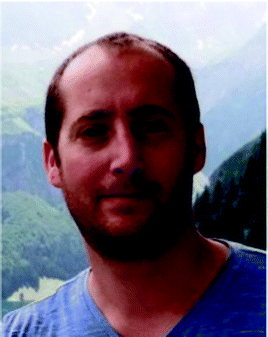Materials Horizons Emerging Investigator Series: Dr Elad Koren, Technion – Israel Institute of Technology, Israel
Dr Elad Koren is heading the Nanoscale Electronics group at the Faculty of Materials Science and Engineering at the Technion – Israel Institute of Technology. His research interests are focused on nanoscale (opto)electronics and electromechanical properties of 2-dimensional (2D) layered materials. Before joining the Technion Elad he served as a principle investigator in the Physics of Nanoscale Systems group in the Science and Technology Department at IBM Research, Zurich. Elad holds a BSc in biophysics and MSc in physical chemistry with an emphasis on photovoltaics, both from Bar Ilan University, Israel. He received his PhD degree in engineering, physical electronics from Tel Aviv University, Israel.
Read Elad Koren's Emerging Investigator Series article ‘Bright excitonic multiplexing mediated by dark exciton transition in two-dimensional TMDCs at room temperature’ ( 10.1039/D1MH01186C ) and read more about him in the interview below:
MH: Your recent Materials Horizons communication demonstrates room-temperature wavelength multiplexing of the bright excitonic channels in monolayer transition metal dichalcogenides. How has your research evolved from your first article to this most recent article and where do you see your research going in future?
EK: Our main research interests focused on nanoscale electronic and optoelectronic properties of 2-dimensional (2D) materials. As such, we are using 2D materials to construct novel devices and follow their characterization using various types of scanning probe techniques such as Kelvin probe force microscopy (KPFM), scanning photocurrent, Raman/PL mapping etc. This led us to the observation that the PL of TMDCs-based materials changes significantly when the focal plane moves in a vertical direction with respect to the sample. From there, we joined with multiple experimental and theoretical groups to explain this interesting behaviour resulting in the above-mentioned publication. The study of excitons and their control using optical and electronic handles is very timely and promising from both fundamental and technological points of view and we look forward to continuing this research in collaboration with other excellent research groups.
MH: What aspect of your work are you most excited about at the moment?
EK: The study of 2D materials, and in particular their heterostructures, promises an endless landscape for research opportunities and discoveries. These structures hold exotic properties starting from their mechanical performance showing unique superlubric characteristics (ultra low friction), electronic intra-layer and inter-layer charge transport, optics and more. As a consequence, such material superlatives can lead to numerous breakthroughs in science and technology.
MH: In your opinion, what are the most important questions to be asked/answered in this field of research?
EK: There are several key challenges that must be fulfilled in order to enable the industrial integration of 2D materials. One of the most critical ones is the wafer scale fabrication of high quality 2D materials along with control over their layer number. Second, since the current state is that high quality growth can only take place at relatively high temperatures (>600 °C), it is required to develop efficient transfer techniques from the growing substrate to the target sample.
MH: What do you find most challenging about your research?
EK: The handling of 2D materials is challenging due to the low thickness of these materials. At this point, devices made out of heterostructures are assembled in a manual fashion and require a lot of expertise. From a scientific point of view, many open questions still need to be answered regarding the physical properties and this is why we find this research topic very interesting and fulfilling.
MH: In which upcoming conference or event may our readers meet you?
EK: I will be attending the MRS spring meeting in Hawaii on May 08–13, 2022 and the Dissipation Mechanisms in Nano/Mesoscale Tribological Systems in Trieste on 30 May–2 June 2022 at the Abdus Salam International Centre for Theoretical Physics.
MH: How do you spend your spare time?
EK: Hanging out with family and friends.
MH: Can you share one piece of career-related advice or wisdom with other early career scientists?
EK: The most important things are to enjoy the journey and keep a good family–work life balance.
| This journal is © The Royal Society of Chemistry 2022 |

